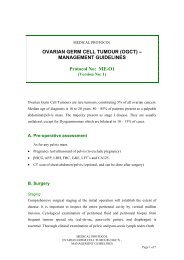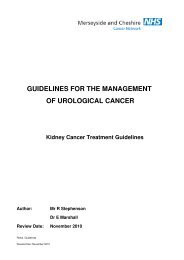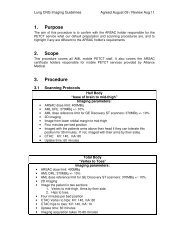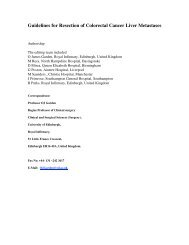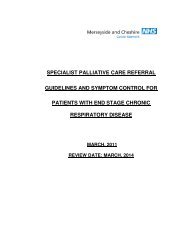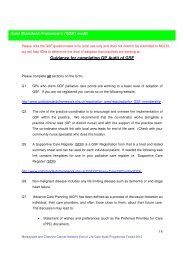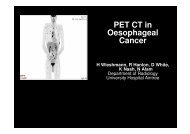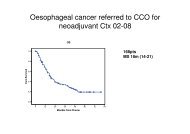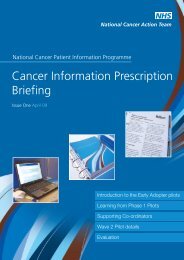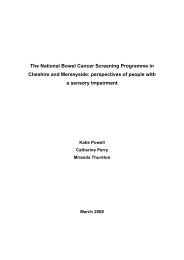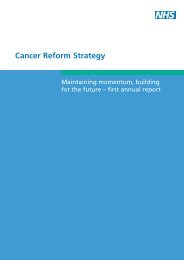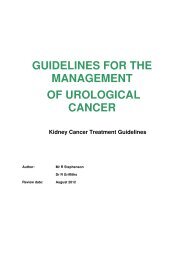Cancer Reform Strategy - NHS Cancer Screening Programmes
Cancer Reform Strategy - NHS Cancer Screening Programmes
Cancer Reform Strategy - NHS Cancer Screening Programmes
- No tags were found...
Create successful ePaper yourself
Turn your PDF publications into a flip-book with our unique Google optimized e-Paper software.
100 CANCER REFORM STRATEGYBox 39: Streamlining recurrent admissions of cancer patientsSherwood Forest, one of the <strong>Cancer</strong> Services Collaborative pilot sites, has designed, tested andsuccessfully implemented an effective Recurring Admissions Patient Alert (RAPA) system. Alertsare generated electronically when a known cancer patient is logged on the Patient AdmissionSystem (PAS). Alerts are sent as an email to a designated key worker (usually a clinical nursespecialist) via a hand held blackberry device.The clinical team responsible for the patient is then able to assess the patient immediately.Unnecessary admissions can be avoided. When admission is needed the patient can be sent toan appropriate location.The system has proved so successful that it is being applied across a range of tumour sites andother long term conditions. It is also now being used successfully in other hospitals.Next steps for inpatient care7.37 Given the importance of inpatientcare from a patient perspective and theopportunities to release resources for otheraspects of care, PCTs, working with cancernetworks, should give high priority to:●●●●●Reviewing current bed utilisation byboth tumour group andelective/emergency split against nationalbenchmarks;Ensuring that providers take upopportunities to participate in cancerinpatient management programmes;Developing local strategies to tackle thekey causes of avoidable admissions andlong lengths of stay;Considering establishing ambulatoryfacilities and models of care; andUsing commissioning levers to drivechange and get best value for money.7.38 Action to improve inpatient care forcancer patients will need to involveclinicians and managers in a wide range ofdisciplines within the secondary sector aswell as those working in the communitysuch as GPs, community nurses and socialservices. PCTs are encouraged to ensure thatall relevant groups and services areinvolved in considering and implementingthese new models of cancer care.7.39 To encourage and support localimplementation of these recommendations,the <strong>Cancer</strong> Services CollaborativeImprovement Partnership and the <strong>Cancer</strong>Action Team are developing a programmeof work on inpatient management. TheInpatient Management Programme willfocus initially on providing support andguidance on service improvement fordifferent categories of patients, such aspatients admitted electively for surgery orchemotherapy and patients admitted as anemergency who are subsequentlydiagnosed with cancer.7.40 Some of these recommendations willrequire modest investment. However, overall,they will not only result in improved experiencesfor patients, but also significant cost reductions.If a 25% reduction in non-surgical admissionsfor cancer were achieved across the country,estimates suggest this would result in a £340million reduction in costs. Such cost reductionsfrom improved care will clearly be veryimportant in ensuring that the <strong>NHS</strong> can affordto deal with rising overall demand for cancercare over the coming years. Chapter 10 of thisstrategy sets out in more detail the opportunitiesfor improving efficiency and minimising costs incancer services.Multidisciplinary team working7.41 Ten years ago cancer services in thiscountry were very fragmented. There was poorcommunication between primary, secondary andtertiary care and within hospitals and planning



